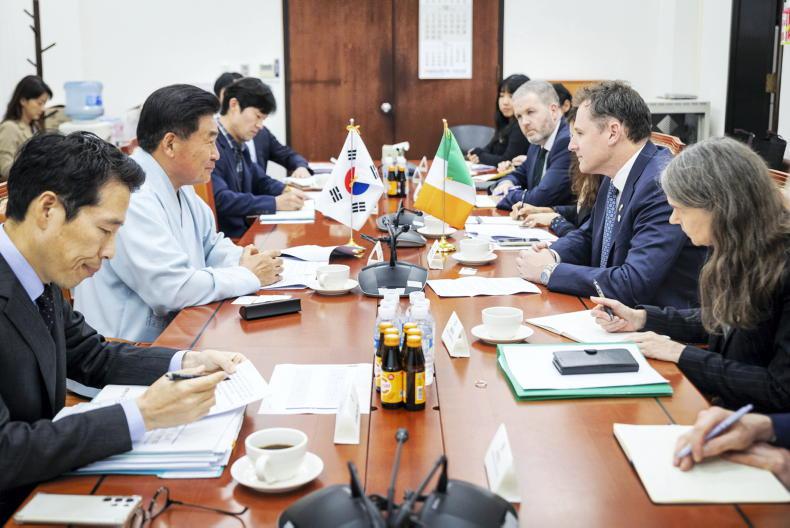A big effort has been made this week to finally secure Irish beef access to the lucrative South Korean market.
This has been a long process, and while an agreement has been in place since May 2021, it has been going through the National Assembly approval process and scrutiny by the agriculture committee since.
France is on the same approval path as Ireland, while Denmark and Netherlands already have access. The process was given a jolt in May this year, when it was raised by Commission president Ursula Von der Leyen during the EU South Korea summit.
EU Trade Commissioner Dombrovskis moved on to South Korea from last weekend’s G7 meeting in Japan to co-chair a ministerial-level committee meeting, with his South Korean counterpart on Tuesday this week.
The purpose of this was to officially review the implementation of the overall EU South Korea trade deal, but the Irish Farmers Journal understands that getting the Irish and French access for beef cleared through the South Korea approval process was an EU priority in this meeting.
The Irish Farmers Journal also understands that Commissioner Dombrovskis also held talks with the chair of the National Assembly’s agriculture committee – again, with Irish and French beef access high on the agenda.
This all coincides with the Taoiseach Leo Varadkar and Ministers McConalogue, Coveney and Harris leading a trade mission to the country this week.
While there is a much broader trade base between South Korea and Ireland than agriculture, it would indeed be particularly timely if progress was made on securing a start date for Irish beef access to the country, joining pig meat exports, which are already well established in the market.
Importance of South Korean beef market
South Korea is the fourth-largest beef importer in the world after China, the US and Japan.
The United States Department of Agriculture (USDA) is forecasting that they will import 610,000 tonnes (t) carcase weight equivalent of beef in 2024, a 60,000t increase on the volume imported in 2019.
Most of their imports are sourced from the US, who exported 292,000t product weight* to South Korea in 2022, and Australia, who exported 161,000t product weight.
*Product weight is the weight of beef cuts only and is around two thirds of carcase weight.
Ireland is already a supplier of pigmeat to South Korea, and in 2023 to the end of August, we exported 3,478t, which is well down on the 7,454t exported in the same period last year.
It is correctly identified as a market with potential for Irish beef exports, but even when approval is secured, it will be a challenge.
For a start, the agreement was for beef – including bone in, but not ground or processed beef – from cattle under 30 months.
While this specification is restrictive, it is less so than China, which excludes bone in beef and is manageable for Irish exporters.
Potential for Irish beef
What will be more of a challenge is the commercial viability of Irish exporters doing business in this market in face of US and Australian competition, even though US cattle are much more expensive than Irish cattle at present.
Ireland already has approval for beef exports to Japan, but for the first eight months of 2023, exported just 766t of beef to that market, and volumes have been in decline over recent years, having reached 3,322t for the first eight months of 2021.
With South Korea being just 35% self-sufficient for beef and having the highest level of per capita consumption in Asia, it has to be one of the best potential export markets for beef outside the EU.
The EU-South Korea trade deal also means that tariffs will be phased out completely by 2027, which means Irish beef exports won’t be disadvantaged in the way that they are to the US.
It is a market that may not deliver immediately, but should have some longer-term potential, and one that is worth securing access to.
Comment
Even though opening markets in China, Japan and previously the US haven’t delivered meaningful beef exports, it remains a worthwhile process and something that only the Government can do.
With South Korea being just 35% self-sufficient for beef and having the highest level of per capita consumption in Asia, it has to be one of the best potential export markets for beef outside the EU
Our best chance of maximising value for Irish produce is to have access to the widest number of markets possible.
Getting access to South Korea won’t add a cent to the value of Irish cattle this week, but it could do in a year, or even five years, from now. It certainly delivers for the US and Australian exports.






 This is a subscriber-only article
This is a subscriber-only article










SHARING OPTIONS: